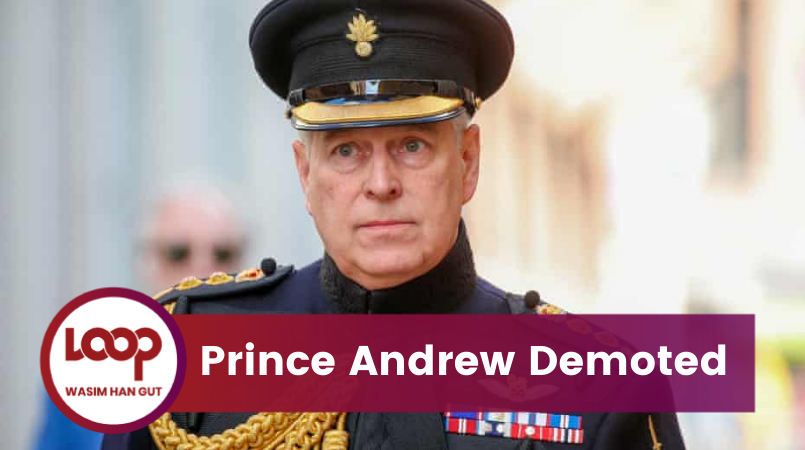
When the announcement of Prince Andrew’s sudden royal demotion came at a few minutes past 5pm on Thursday, the level of its brutality didn’t take long to sink in for people who know how the royal family works.
“I don’t know what the richter scale goes up to but this is a big earthquake,” one source told the Guardian. “This feels to me like a straightforward ejection or excommunication. This is the most serious step they could have taken.”
Gone were the Duke of York’s military affiliations – ranging from being colonel-in-chief of the Royal Irish Regiment to colonel of the Grenadier Guards. And gone were his royal patronages – including a characteristically large numbers of golf clubs, but also good causes such as the SickKids Foundation and the Royal Free London NHS Foundation Trust. He will retain his military rank of Vice Admiral and remains in the line of succession to the throne.
And then it was reported, via a royal source quoted by the Press Association, that Andrew will no longer use the style “His Royal Highness” in any official capacity
“Losing the HRH style would be the most emotionally damaging because he was born a royal highness,” the source said.
It means Andrew joins the divorcees Diana, Princess of Wales and his own ex-wife, Sarah Ferguson, in losing the use of the styling. The Duke and Duchess of Sussex also had their HRH monikers put into abeyance when they stopped working for the royal family, but, said Dr Ed Owens, royal historian, “they had a choice” about their decision to end their life as working royals.
“We know he has been trying to cling on to the last semblance of respectability in public life and keeping himself present,” Dr Owens said. “It now looks like that has backfired.”
The Buckingham Palace statement was terse, but devastating and left readers in no doubt about where authority lay.
“With The Queen’s approval and agreement, The Duke of York’s military affiliations and Royal patronages have been returned to The Queen,” it said. “The Duke of York will continue not to undertake any public duties and is defending this case as a private citizen.”
There was no need to increase the reputational damage to the British monarchy with any mention of Andrew’s former friends Jeffrey Epstein and Ghislaine Maxwell, respectively a convicted paedophile and a convicted sex trafficker. Neither did the palace mention that the case it alluded to was being brought in a US civil court by Virginia Roberts Giuffre who claims she was trafficked by Epstein to have sex with powerful people, including Andrew, when she was 17. Andrew has consistently denied her allegations.
The seismic blow to Andrew’s status came as his team were still reeling from the fallout of the New York Court decision to reject his attempt to stop Giuffre’s case in its tracks.
A source close to Andrew said: “Given the robustness with which Judge Kaplan greeted our arguments, we are unsurprised by the ruling. However, it was not a judgment on the merits of Ms Giuffre’s allegations. This is a marathon not a sprint and the duke will continue to defend himself against these claims.”
David McClure, the author of the Queen’s True Worth, said the Queen’s decision was “a sensible and indeed inevitable move to restrict any further damage he might do in the future”.
“It is overdue and in some ways it should have been done earlier,” McClure said. “Some damage has already been done but there is the possibility of more to come. Even if he is cleared in the court, his reputation is finished and he has done damage to the royal family because of his association with Epstein and Maxwell.”
The decision to take back the duke’s military affiliations and royal patronages had been widely discussed among senior members of the royal family, including with the Prince of Wales and the Duke of Cambridge.
The duke’s roles have been handed back to the Queen with immediate effect for redistribution to other members of the royal family. Sources stressed that they will not be returned to Andrew.
Such a series of steps to strip Prince Andrew of his status, would probably have been hard for the Queen, who is often described as having had a very strong bond with her second-eldest son.
“I think for the Queen to be forced down this route would be devastating for him and for her,” one royal source said. “The military patronages will be heart-breaking for him and it was all he had left. His outstanding achievement in his working life was limited to his military career and what he did in the Falklands.”
“This has come more swiftly and is more brutal than I expected,” they added.
It was more brutal than the fate of Prince Harry and the Duchess of Sussex, as the semi-divorce from the Royal household was partly of their making, the source said. Key outstanding questions include whether Andrew will retain financial support from the royal family and his home in the grounds of Windsor castle.
“It is absolutely right that Andrew has now returned his military titles to the Queen,” said royal author and former government minister Norman Baker. “It had become an embarrassment all round, not least for the military, for him to continue for example to be colonel-in-chief of the Grenadier Guards.
“The fact that the Palace is now describing him as a private citizen in respect of his court case tells us he has well and truly been chucked under the royal bus, yet the royal family cannot escape the immense damage that will increase as the American court case progresses. Can he now even stay as Duke of York, or having been marched up that hill by the Queen, will he be marched down again?”
Story first published on The Guardian
